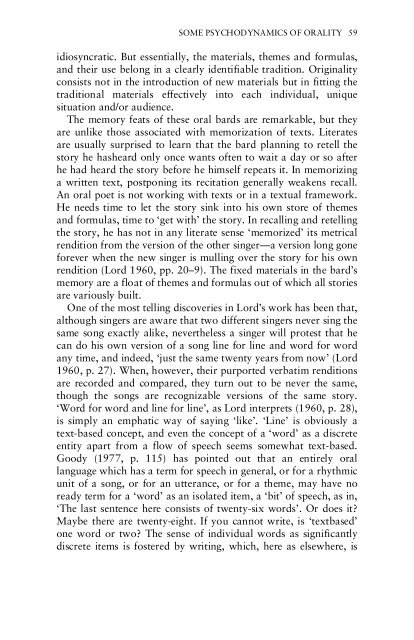Orality and Literacy: The Technologizing of the Word - Monoskop
Orality and Literacy: The Technologizing of the Word - Monoskop
Orality and Literacy: The Technologizing of the Word - Monoskop
Create successful ePaper yourself
Turn your PDF publications into a flip-book with our unique Google optimized e-Paper software.
SOME PSYCHODYNAMICS OF ORALITY 59<br />
idiosyncratic. But essentially, <strong>the</strong> materials, <strong>the</strong>mes <strong>and</strong> formulas,<br />
<strong>and</strong> <strong>the</strong>ir use belong in a clearly identifiable tradition. Originality<br />
consists not in <strong>the</strong> introduction <strong>of</strong> new materials but in fitting <strong>the</strong><br />
traditional materials effectively into each individual, unique<br />
situation <strong>and</strong>/or audience.<br />
<strong>The</strong> memory feats <strong>of</strong> <strong>the</strong>se oral bards are remarkable, but <strong>the</strong>y<br />
are unlike those associated with memorization <strong>of</strong> texts. Literates<br />
are usually surprised to learn that <strong>the</strong> bard planning to retell <strong>the</strong><br />
story he hasheard only once wants <strong>of</strong>ten to wait a day or so after<br />
he had heard <strong>the</strong> story before he himself repeats it. In memorizing<br />
a written text, postponing its recitation generally weakens recall.<br />
An oral poet is not working with texts or in a textual framework.<br />
He needs time to let <strong>the</strong> story sink into his own store <strong>of</strong> <strong>the</strong>mes<br />
<strong>and</strong> formulas, time to ‘get with’ <strong>the</strong> story. In recalling <strong>and</strong> retelling<br />
<strong>the</strong> story, he has not in any literate sense ‘memorized’ its metrical<br />
rendition from <strong>the</strong> version <strong>of</strong> <strong>the</strong> o<strong>the</strong>r singer—a version long gone<br />
forever when <strong>the</strong> new singer is mulling over <strong>the</strong> story for his own<br />
rendition (Lord 1960, pp. 20–9). <strong>The</strong> fixed materials in <strong>the</strong> bard’s<br />
memory are a float <strong>of</strong> <strong>the</strong>mes <strong>and</strong> formulas out <strong>of</strong> which all stories<br />
are variously built.<br />
One <strong>of</strong> <strong>the</strong> most telling discoveries in Lord’s work has been that,<br />
although singers are aware that two different singers never sing <strong>the</strong><br />
same song exactly alike, never<strong>the</strong>less a singer will protest that he<br />
can do his own version <strong>of</strong> a song line for line <strong>and</strong> word for word<br />
any time, <strong>and</strong> indeed, ‘just <strong>the</strong> same twenty years from now’ (Lord<br />
1960, p. 27). When, however, <strong>the</strong>ir purported verbatim renditions<br />
are recorded <strong>and</strong> compared, <strong>the</strong>y turn out to be never <strong>the</strong> same,<br />
though <strong>the</strong> songs are recognizable versions <strong>of</strong> <strong>the</strong> same story.<br />
‘<strong>Word</strong> for word <strong>and</strong> line for line’, as Lord interprets (1960, p. 28),<br />
is simply an emphatic way <strong>of</strong> saying ‘like’. ‘Line’ is obviously a<br />
text-based concept, <strong>and</strong> even <strong>the</strong> concept <strong>of</strong> a ‘word’ as a discrete<br />
entity apart from a flow <strong>of</strong> speech seems somewhat text-based.<br />
Goody (1977, p. 115) has pointed out that an entirely oral<br />
language which has a term for speech in general, or for a rhythmic<br />
unit <strong>of</strong> a song, or for an utterance, or for a <strong>the</strong>me, may have no<br />
ready term for a ‘word’ as an isolated item, a ‘bit’ <strong>of</strong> speech, as in,<br />
‘<strong>The</strong> last sentence here consists <strong>of</strong> twenty-six words’. Or does it?<br />
Maybe <strong>the</strong>re are twenty-eight. If you cannot write, is ‘textbased’<br />
one word or two? <strong>The</strong> sense <strong>of</strong> individual words as significantly<br />
discrete items is fostered by writing, which, here as elsewhere, is

















